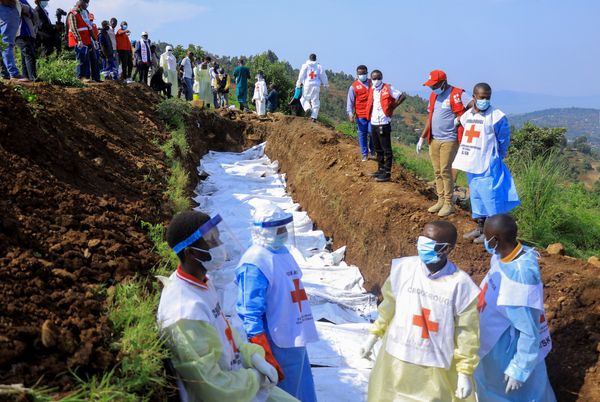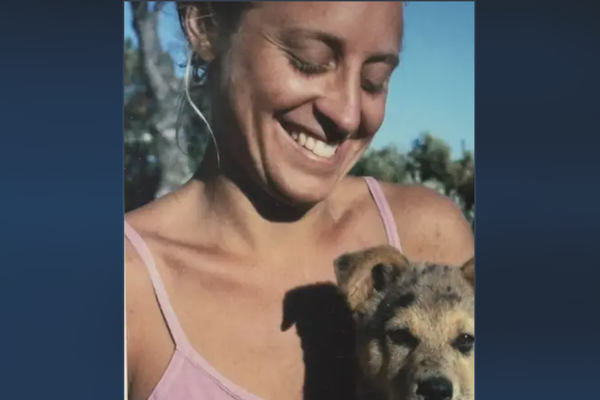Judi Marlow has called her private rental in Tasmania's north-west home for almost a decade.
But, since an injury and ongoing complications left her dependent on an electric wheelchair a few years ago, moving around inside it, let alone getting out of it, has become a constant struggle.
"It's an old house," Ms Marlow said. "It's got a step down to the laundry bathroom and outside.
"It's an electric wheelchair. It's 80 kilograms, you can't drive them outside the house without ramps so I've been locked in."
Getting around to specific rooms also presents a challenge.
"I have to transfer out of my wheelchair onto a little stool with wheels because the wheelchair can't go into the bathroom, only into the bedroom or the lounge, and the bathroom's like an old 1950s one with a shower bath.
"It makes my life a lot more of a struggle."
With her landlord wanting to sell the house, installing a permanent ramp hasn't been an option, with a temporary ramp installed just last week setting her back $1,800.
Ms Marlow is on the waitlist for public housing, including as a priority applicant for 18 months — but with no indication of when accessible public housing might be available, she says she feels helpless.
"[My landlord] has been very patient, because he knows I'm doing everything I can to get social housing," she said.
"But I'm just worried. I'm in a powered wheelchair. I can't see myself living in a tent, I can't drive anymore, I can't live in my car and I have no relatives to stay with.
"I'm on my own and it's very scary."
Waitlist number growing
Ms Marlow is part of an increasing cohort of vulnerable Tasmanians waiting for public housing — with the number of women with a disability on the waitlist having close to doubled between 2017-18 and September 2022, according to figures tabled by the government last year.
The data showed in 2017-18, 494 women on the housing register were living with disability. As at the end of September 2022, that number was 867.
Bec Bradfield from Advocacy Tasmania works with clients in similar positions to Ms Marlow regularly.
She said one of the common things her clients are seeking is insight into where they are in the queue for public housing, but that's not something she can shed light on.
"The situation is that there's a complete lack of transparency in the decision-making process, and our clients tell us their perception is if they make a fuss, if they try to push … they're seen as being difficult and a problem and then their application isn't looked at favourably," Ms Bradfield said.
"They've got all the medical evidence to support their needs for housing, and they don't understand why they haven't been given answers about what more they need to do.
"When clients come to us, women with disabilities, we just hear total desperation, and utter despair."
Graeme West, interim state manager of National Disability Services Tasmania, said the situation was leaving an already vulnerable cohort in very difficult positions, with the housing crisis overall disproportionately impacting women.
"We're leaving people vulnerable, and potentially at risk and not in a situation where disability support workers can provide safe support to them, to make sure they can live the life they desire to live," he said.
He said that was why it was vital that conversations between the government, NDS and Shelter Tasmania continued, to make sure this wasn't an issue that got overlooked.
"We're strongly saying there should be a specific strategy focus on issues around women and women with disability.
"To get suitable housing is a paramount need, and there's certainly an inefficient process at the moment to fully identify where housing is available."
Adrienne Picone, chief executive of the Tasmanian Council of Social Service, echoed Mr West's sentiment, and said that all future homes needed to be designed and built with access and inclusivity at the front of mind.
"The number of women with a disability on the housing register has doubled in the last five years," Ms Picone said.
"We know that without appropriate housing many of these women are unable to access the supports they need, things like physiotherapy and occupational therapy, but it also undermines their ability to be able to participate economically, socially and culturally in the life of our state.
The government plans to build 10,000 new social and affordable homes by 2023 and a 20-year Tasmanian Housing Strategy currently in development will also target these issues.
Ms Picone said it highlighted the "urgent need" for the strategy to address the needs of people with a disability in the immediate as well as the long term.
Tasmania's housing minister Guy Barnett said the government would release a strategy for providing homes for women with disabilities later this year.
Six new accessible units were opened in Devonport in the state's north-west by the minister today.
He said Homes Tasmania has been analysing the state's waiting list.







